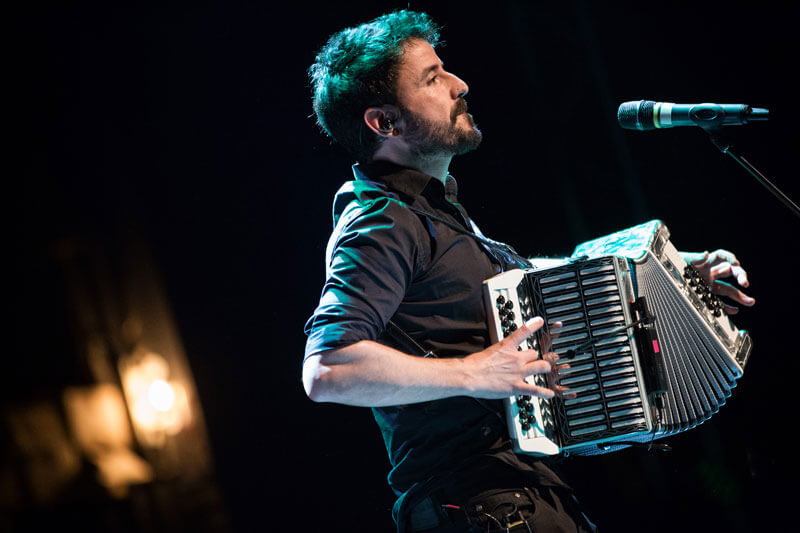In the world of Basque music, few artists have left as deep a mark as Xabi Solano. With his trikitixa in hand, Solano has managed to combine the energy of traditional folk with modern influences, revitalizing an instrument that, although it has centuries-old roots, has found in it a fresh and contemporary voice. In this blog, we will explore who Xabi Solano is, his influence on the Basque musical scene and the fundamental role of the trikitixa in his career.
What is Trikitixa?
The trikitixa is a diatonic accordion of Basque origin which is characterized by its vibrant and rhythmic sound. Despite its Basque roots, the instrument was introduced at the end of the 19th century in Euskadi, probably from Italy or Germany, and quickly adapted to the popular music of the region. Currently, it is a fundamental piece in the folk music of the Basque Country.
Over the decades, the trikitixa has been performed by great figures of traditional Basque music. However, Xabi Solano has put a unique spin on this instrument, opening the doors to a new generation of musicians and fans.
Xabi Solano's First Steps in Music
Xabi Solano was born in Hernani, Gipuzkoa, in the Basque Country. From a young age he showed a special interest in traditional and folk music, beginning to play the trikitixa at an early age. His first forays into music led him to join Etzakit, a band with a punk-folk sound that was the seed of his musical career. Later, he joined the band Esne Beltza, a project that fuses reggae, ska, and other modern styles with traditional Basque music, where the unique sound of Solano's trikitixa became one of the most distinctive elements.
The Unique Style of Xabi Solano
Solano's innovation with the trikitixa has been a mix of passion and technique. His style is characterized by the combination of frenetic rhythms with touches of reggae, ska, and punk, generating a sound that, while maintaining the Basque essence, is capable of resonating on international stages. In addition to being an exceptional performer, he is also a versatile composer, capable of writing everything from high-energy festival pieces to more introspective songs.
In his live performances, Solano is known for his great charisma and energy. Not only does he play, but he dances, sings and connects in a unique way with the audience, making each performance an unforgettable experience. For Solano, the trikitixa is not just an instrument, but an extension of his identity and his culture.
Solano's Impact on Basque Music and Beyond
The impact of Xabi Solano has crossed borders. His collaborations with artists from different genres and countries have contributed to internationalizing trikitixa, taking it to stages around the world. Furthermore, his ability to fuse styles has paved the way for a new generation of young musicians who see the trikitixa as a modern, dynamic and versatile instrument.
Solano's career with Esne Beltza has been especially influential in this regard. The band has been able to connect with young audiences and has revitalized interest in Basque folk, adapting it to contemporary tastes. The message of his songs, many of them in Basque, addresses issues of identity, resistance and social justice, aspects that have always been fundamental in Basque music.
The Legacy of Xabi Solano
Xabi Solano has shown that the trikitixa can be much more than a symbol of tradition. Under his direction, the instrument has evolved and adapted, finding new meaning and relevance in the 21st century. Their contributions have helped keep Basque culture alive, while paving the way for a more global and diverse sound.
Through his music, Xabi Solano has brought the trikitixa to audiences who, otherwise, perhaps would never have heard the sound of this accordion. His legacy is being built not only in records and concerts, but in the inspiration he has sown in a new generation of musicians who, following his example, keep the flame of traditional Basque music alive.
